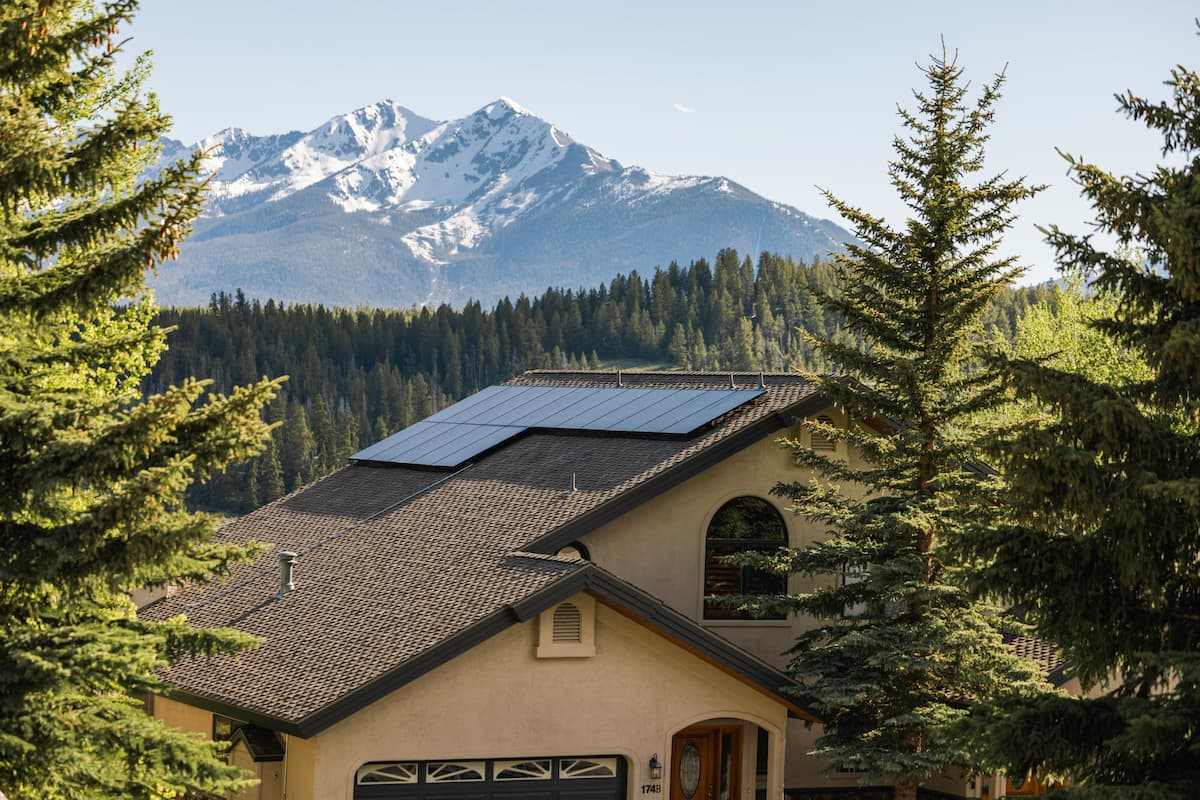
- High Country Conservation
- August 4, 2024
- Ask Eartha
Dear Eartha, I’ve been thinking about getting solar panels for my home, but I’m curious about how they’ll perform in Summit County’s long winters. If the snow covers them up, do they still work?
Summit County gets an average of 245 days of sunshine a year, but we also get a lot of snow. Despite this wintertime bounty, solar panels are popping up on rooftops all over the county. Why? Because they’re an excellent way to generate your own carbon-free electricity. But don’t take it from just me – let’s talk to your neighbors about their experiences. Eartha interviewed three Summit County residents who’ve had solar panels installed for at least three years. Here are insights from Jessie, Kasey, and Jeff on some common questions about going solar.
Does Snow Stick on Solar Panels?
The good news is that solar panels are designed with a slick, glass surface, making it easy for snow to slide off. Plus, the dark color of the panels absorbs sunlight, which helps melt snow more quickly than it would on a regular roof. Indeed, all three locals interviewed have not had issues with snow lingering on the panels for too long. After storms pass and the sun shines again, snow sheds quickly – and cleans the panels in the process.
Do You Have to Clean the Panels?
For the most part, solar panels are pretty low maintenance. In Summit County, where we get a mix of sun and snow, natural weather patterns often help keep the panels clean. Rain can wash away dust and dirt, and as mentioned, snow slides off on its own. Jessie, Kasey and Jeff have never cleaned their panels during the time they’ve owned them.
Do You Still Have an Electric Bill with Solar Panels?
According to Jessie, “it depends on the month.” Overall, her annual electricity bill is lower now than before she had the solar panels. During the summer, her panels often produce more electricity than her family needs, which means she only pays a connection fee (this is a standard monthly fee we all pay for being connected to the grid).
What happens to that excess electricity? It’s sent back to the grid, helping to provide renewable energy for other people. But that doesn’t mean that Jessie’s family loses out on the extra electricity their panels generate. Instead, Xcel Energy puts that energy into a virtual bank account. So when Jessie’s solar panels don’t make enough energy to power her home, like at night or during a cloudy day, her family gets to pull from this electrical bank account. Even though they’re using power from the grid, they won’t have to pay for it as long as they have extra electricity in the bank. This program is called net-metering, and it’s provided to everyone who has solar panels.
It’s Time to Solarize, Summit!
If you’ve been considering solar, there’s no better time to power your home with sunshine. High Country Conservation Center’s (HC3) Solarize Summit program is open for enrollment through the end of August and offers fantastic incentives that make going solar more affordable. Here’s a breakdown of the savings you can enjoy:
- Local Jurisdiction Rebate: $1,650+
- BONUS Summit Qualified Resident Rebate: $2,000
- Active Energies Solar Discount: 5% of the system cost up to $1,500
- Federal Tax Credit: 30% of the system cost
In total, you can save up to $5,000 off the cost of your system before even considering the 30% federal tax credit. Kasey, who participated in Solarize Summit back in 2019, had almost half her system paid for by local incentives and the federal tax credit. Her advice to community members? It’s “totally worth the investment!” If you’re ready to explore solar options or have more questions, call the team at HC3 to help you navigate the process.
So, why wait? The sun is shining, the incentives are more attractive than ever, and the benefits of going solar are undeniable—significantly lower energy bills throughout the year and a meaningful step towards a more sustainable future. Let’s take full advantage of Summit County’s abundant sunshine and make a positive impact on our community.
Ask Eartha Steward is written by the staff at the High Country Conservation Center, a nonprofit dedicated to waste reduction and resource conservation. Submit questions to Eartha at info@highcountryconservation.org.
